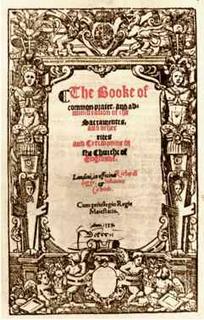Daily Prayer

One of the greatest discoveries in my spiritual life has been that of what is called "common prayer" or the "office"--oftentimes associated by many Protestants only with monasticism. It is clear, however, from the Preface written by Thomas Cranmer that corporate prayer was meant to be an integral part of the Church of England, as well. In fact, one of the homilies from 1563, with which I worked, develops an apologetic for praying the office--which came to be echoed in the work of Richard Hooker.
My first exposure to the practice was with a group of theology students from Greenville in 1976 on a pilgrimage to St. Meinrad's monastery in Indiana. I was immediately taken by the sense of sacred space and sacred time, all wrapped up in the Benedictine motto, "ora et labora" (prayer and work). As a seminary student, I began to practice morning prayer by myself and, since then, have collected numerous materials and prayer books to assist me. It is clear from the publishing boom of Phyllis Tickle's three-volumed The Divine Hours and Kathleen Norris' Cloister Walk that I am not alone in my discovery of this ancient practice.
With the possible purchase of a larger church setting at St. Paul's, I am hopeful of actually developing a place for the practice of regular corporate prayer using Morning Prayer, in particular. After much thought and prayer I have chosen to become an oblate in the Order of St. Luke, a religious order in the Wesleyan tradition dedicated to sacramental and liturgical scholarship, education, and practice. It is my hope that I will be able to keep the vows I am making today to affirm the Apostolic Hope, to live for the Church of Jesus Christ, to seek the sacramental life, to promote corporate worship of the church, to magnify the sacraments, and to accept the call to service.
In his little book, The Rhythm of God's Grace, Anabaptist theologian, Arthur Paul Boers, points out the problems of a form of prayer that is always ad hoc, self-directed, disconnected, and subjective. I need the discipline that comes from praying daily in a fixed fashion which provides spaces for me to hear and be engaged by the larger community. I find more freedom in framing my own prayers when I am guided by the words of the saints, hammered out over time. Boers concludes: "Such fixed-hour prayer helps us pay attention to God and God's realities, 'the deepest thing we know.'" It embraces the whole of one's life. It offers consistent disciplines on a daily basis," (5). Lord, teach me to pray.


<< Home